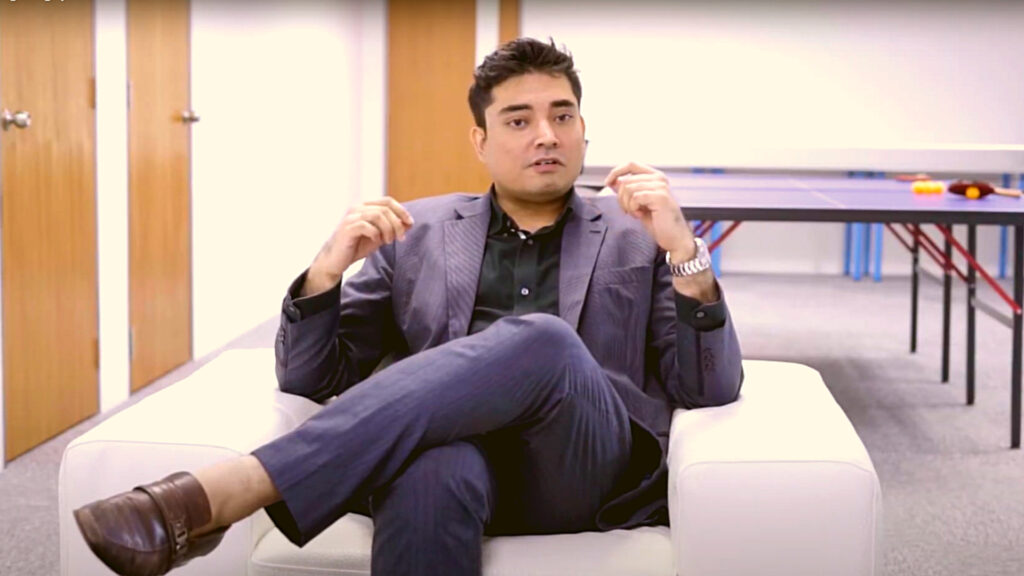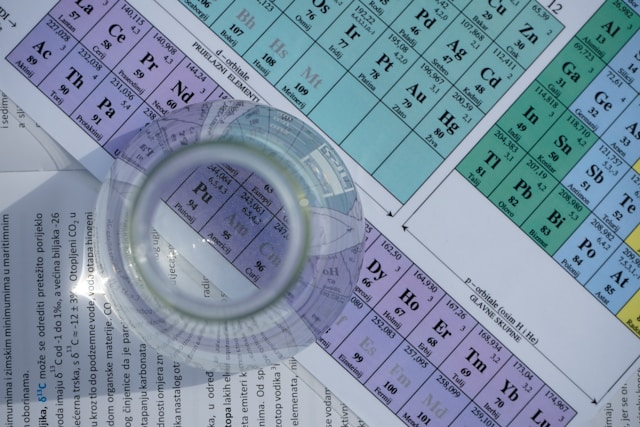Sancy Suraj, the Singaporean memory coach, has earned his place in the memory hall of fame with six record-breaking feats, including reciting over 1,500 digits of pi and identifying all the elements of the periodic table in just four minutes and 19 seconds. In this article, we’ll delve into Sancy Suraj’s memory mastery, exploring his preparation techniques, memory methods, and future challenges. We’ll also learn how memory training has impacted his life beyond competitions, providing him with a sense of personal fulfillment and opening new possibilities for his career.

How did you prepare for the record-breaking recitation of the periodic table?
As a memory coach and competitor, preparation is key to achieving record-breaking performances. For the periodic table recitation, I began by creating a visual journey that connected each element to a specific location or image. For example, I associated hydrogen with a balloon and placed it at the entrance of my childhood home. I also used mnemonic devices to help remember the names and symbols of each element. Mnemonics involve creating memorable phrases or acronyms that relate to the information being memorized. These techniques helped me to create a mental map of the periodic table, which made it easier to recall each element quickly and accurately.
In addition to these techniques, I also used a practice regimen that involved frequent repetition and recall. This involved reviewing the periodic table regularly and testing myself on my recall speed. I also practiced typing the elements quickly to simulate the actual record-breaking attempt. Finally, I made sure to get adequate sleep and proper nutrition leading up to the attempt to ensure optimal brain function and performance.
Overall, the key to preparing for any memory challenge is to develop a personalized system of memorization techniques and practice methods that work for you. With hard work and dedication, anyone can achieve record-breaking results in memory competitions.
Can you share with us some of the techniques you used to remember all the elements?
There are several techniques that I used to remember all the elements of the periodic table, which involves associating each element with a specific location or image along a predetermined mental journey. For example, I might associate helium with a hot air balloon floating above the Statue of Liberty. Another technique I used is acronyms, where I would create a memorable phrase that incorporated the first letter of each element’s name. For example, for the first six elements, I might use the acronym “He Likes Big Brown Cows Not Oats.”
Another technique I used is creating vivid mental images that relate to the properties or uses of each element. For example, for potassium, I might imagine a banana being peeled to reveal a bright yellow metal inside, representing the metal’s color and its presence in bananas. I also used repetition and rehearsal to reinforce my memory of the elements.
In addition to these techniques, it’s important to understand the periodic table’s structure and patterns, such as the trends in electronegativity and atomic radius, to help with recall. Understanding the groups and periods can also help with remembering the location of each element in the table.
Overall, the key to successfully memorizing the periodic table is to find techniques that work for you and to use them consistently. With practice and dedication, anyone can master the periodic table and achieve record-breaking results in memory competitions.
How did it feel to break the world record for the fastest time to recite the periodic table?
Breaking the world record for the fastest time to recite the periodic table was an incredible experience. It was the result of months of hard work and dedication to developing my memory techniques and perfecting my recall speed. When I realized that I had broken the record, I was elated and overwhelmed with a sense of accomplishment. It was a truly unforgettable moment that I will cherish forever.
This achievement also served as a reminder of the power of the human brain and its incredible potential. It’s amazing what we can achieve when we push ourselves to our limits and apply ourselves to a task with determination and focus. This record-breaking achievement also inspired me to continue to push myself further and to continue exploring the limits of human memory.
However, it’s important to remember that record-breaking accomplishments are not the only measure of success. The journey towards achieving a goal is just as important as the destination, and the lessons we learn along the way can be just as valuable as the accomplishments themselves. I believe that memory training has the power to improve our cognitive abilities and enhance our overall quality of life, and breaking this record is just one small step towards that goal.
“Breaking the world record for the fastest time to recite the periodic table was a monumental moment that reminded me of the limitless potential of the human brain. It’s not just about the record, but the journey of pushing ourselves to achieve the impossible. Memory training unlocks our cognitive abilities and empowers us to reach new heights. The joy of breaking records is surpassed only by the invaluable lessons learned along the way.”
What advice would you give to someone who wants to memorize the periodic table?
If someone wants to memorize the periodic table, I would advise them to start by developing a personalized system of memorization techniques that work for them. This could include visual associations, acronyms, repetition, and mnemonic devices. It’s important to experiment with different techniques and find what works best for your learning style and memory capacity.
Another helpful tip is to break the periodic table down into smaller chunks and focus on memorizing one section at a time. This can make the task more manageable and reduce the risk of feeling overwhelmed. Additionally, understanding the patterns and structure of the periodic table can be helpful in memorization and recall.
Consistency and practice are also key to successful memorization. Regular review and repetition can help reinforce the information in your memory and improve recall speed. It’s important to set realistic goals and be patient with yourself throughout the learning process.
Finally, it’s important to remember that memorizing the periodic table is just one example of the power of memory training. The techniques and skills learned through memory training can be applied to many areas of life, from learning new languages to remembering important information for work or school. Memory training has the potential to enhance our cognitive abilities and improve our overall quality of life.
How has memory training impacted your life outside of memory competitions?
Memory training has had a significant impact on my life outside of memory competitions. Developing my memory skills has helped me to improve my concentration, focus, and overall cognitive abilities. I’ve found that I’m able to learn new information more quickly and retain it for longer periods of time, which has been incredibly useful in both my personal and professional life.
Memory training has also helped me to develop a more organized and systematic approach to learning and problem-solving. By breaking down complex information into smaller, more manageable chunks, I’m able to process and retain information more effectively. This has been particularly helpful in my work as a memory coach, where I help others to develop their own memory skills.
Beyond the practical benefits, memory training has also given me a sense of personal fulfillment and satisfaction. The process of mastering new skills and techniques has been incredibly rewarding, and the sense of accomplishment I feel after successfully memorizing a new piece of information is incredibly fulfilling.
Overall, memory training has had a profound impact on my life, both personally and professionally. I believe that anyone can benefit from memory training, regardless of their age, background, or profession. It’s a valuable skill that can improve our cognitive abilities and enhance our overall quality of life.
“Memory training has unlocked the full potential of my brain, empowering me with enhanced cognitive abilities, improved focus, and a systematic approach to learning. It has enriched my life beyond competitions, providing me with personal fulfillment and a sense of accomplishment. Memory training is a valuable skill for all, opening doors to endless possibilities in both personal and professional realms.”
Sancy Suraj’s memory skills are not just innate but developed through extensive practice and dedication. In preparing for his record-breaking recitation of the periodic table, Sancy used a combination of visualization techniques, association methods, and mnemonics. He turned each element into a vivid image and linked it to other elements using creative associations, such as linking Boron (B) to Bollywood or Silicon (Si) to a silicone breast implant. These techniques allowed him to memorize the elements’ names and symbols with remarkable speed and accuracy.
Breaking the world record for the fastest time to recite the periodic table was a moment of immense pride and joy for Sancy Suraj. He described it as a surreal experience, knowing that he had achieved something that no one else had done before. Sancy is a true believer in the power of memory training and advises anyone looking to memorize the periodic table to start with the fundamentals, understand the patterns and trends, and use memory techniques such as visualization, association, and repetition.
Memory training has had a profound impact on Sancy Suraj’s life beyond memory competitions. He has developed sharper cognitive abilities, improved focus and concentration, and a more systematic approach to problem-solving. These skills have been invaluable in his role as a memory coach, where he helps others to improve their own memory skills. Sancy is also interested in exploring the potential applications of memory training in practical settings, such as helping individuals with memory loss or cognitive impairment or enhancing students’ learning abilities.
What memory challenges are you planning to tackle next?

I’m always looking for new memory challenges to tackle and ways to push myself further. While I haven’t yet decided on my next big memory challenge, I’m always on the lookout for new opportunities to test and refine my memory skills.
One area that I’m particularly interested in exploring further is the use of memory techniques in practical applications. For example, I’m interested in exploring how memory techniques could be used to help individuals with memory loss or cognitive impairment, such as those with Alzheimer’s disease or other forms of dementia. By developing new memory techniques and strategies that are specifically tailored to the needs of these individuals, I believe we could help to improve their quality of life and enhance their ability to function independently.
I’m also interested in exploring the potential applications of memory training in educational settings. By teaching memory techniques to students, we could help them to learn and retain information more effectively, which could have a positive impact on their academic performance and future prospects.
Ultimately, I believe that memory training has the potential to benefit individuals and society in countless ways, and I’m excited to continue exploring new challenges and opportunities in this field.
“Memory challenges are not just about breaking records, but also about unlocking new possibilities. I’m eager to explore practical applications of memory techniques, from helping individuals with cognitive impairment to enhancing education. The potential of memory training is limitless, and I’m excited to tackle new challenges and make a positive impact in people’s lives.”
Sancy Suraj is an inspiration to memory enthusiasts worldwide, showcasing the remarkable potential of human memory and the power of memory training. His dedication, creativity, and persistence have earned him a place among the memory greats, and his passion for memory training continues to inspire others to explore the possibilities of memory. Through his record-breaking feats and memory coaching, Sancy Suraj has opened new frontiers in the field of memory and continues to push the boundaries of what the human mind can achieve.





























